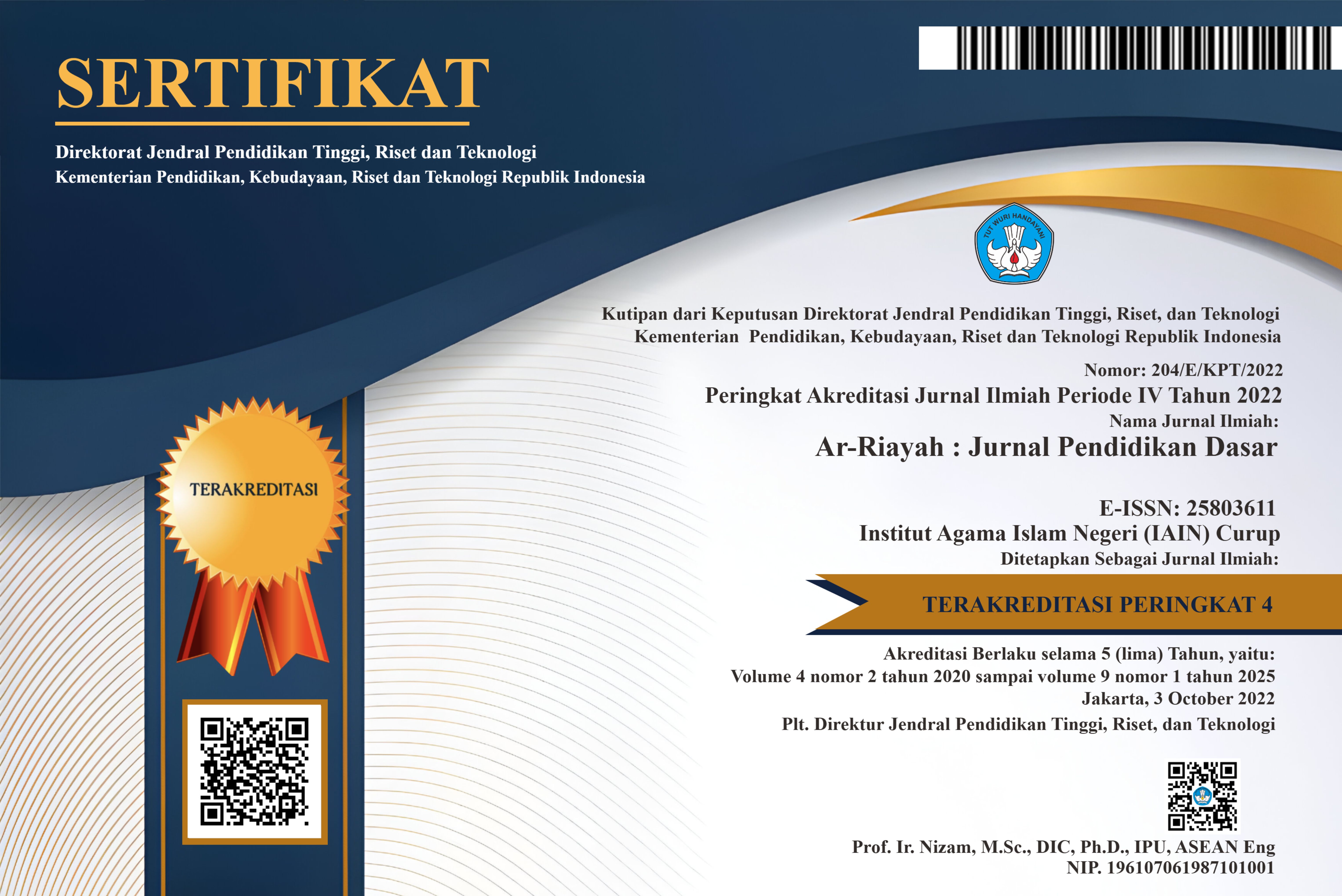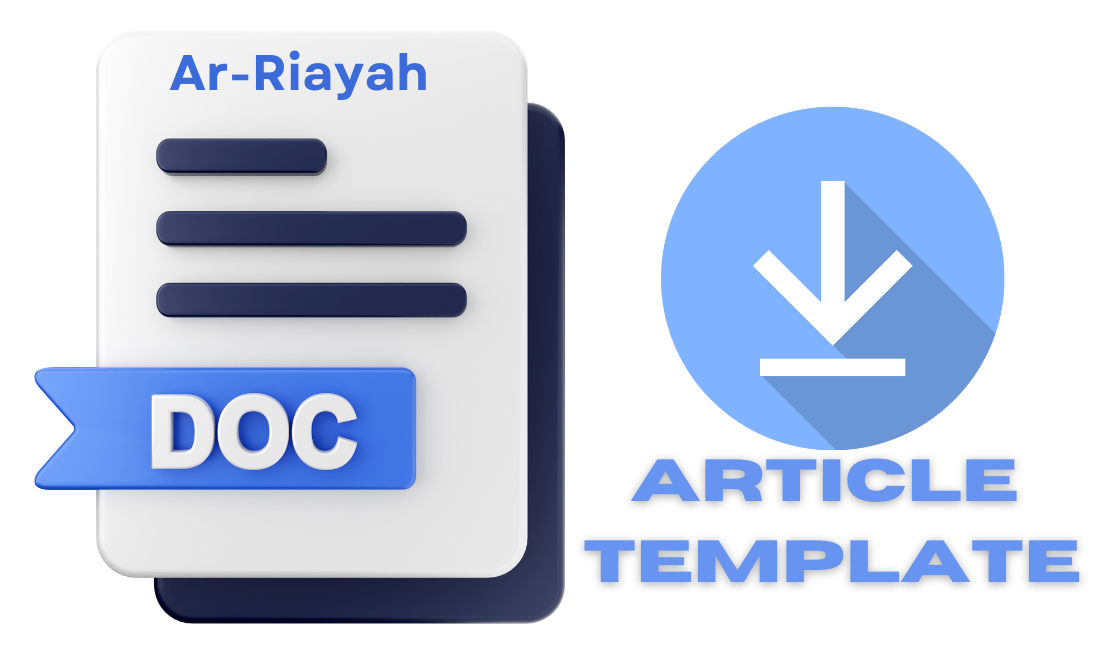Pengaruh Model Pembelajaran Realistic Mathematics Education Berbasis Etnomatematika terhadap Literasi Numerasi Siswa Sekolah Dasar
DOI:
https://doi.org/10.29240/jpd.v8i2.11250Keywords:
Realistic Mathematics Education, ethnomathematic, Numeracy LiteracyAbstract
The use of teacher-centred learning models and the lack of media utilisation in the mathematics learning process contribute to the low numeracy literacy skills of students. This study aims to determine the effect of the Ethnomathematics-based Realistic Mathematics Education learning model on students' numeracy literacy. This type of research is quantitative research with Quasi Experiment method with Non Equaivalent Posttest Only Group Design. The population in this study was elementary schools in Kaliwadas Village and the samples in this study were class V of Kaliwadas 01 Elementary School as the experimental group and class V of Kaliwadas 03 Elementary School as the control group. The data collection technique used test, observation, and documentation. Data analysis technique used regression test and independent t-test. The result showed that Fcount was 65.89 and Ftable was 4.225 so Fcount > Ftable. From the results of the independent t test, it shows that the tcount is 7.2216 and the ttable is 2.01537 so that the tcount> ttable. It can be said that learning with the ethnomathematics-based RME model affects students' numeracy literacy.
Downloads
References
Agustina, Yulia, Ejen Jenal Mutaqin, dan Muhammad Nurjamaludin. “Pengaruh Model Pembelajaran Realistic Mathematics Education (RME) Terhadap Kemampuan Literasi Numerasi” 02, no. 02 (2022).
Ajmain, Herna, dan Sitti Inaya Masrura, “Implementasi Pendekatan Etnomatematika Dalam Pembelajaran Matematika”, SIGMA, no. 1 (Juni 2020): 45-54.
Avrelia Rekalasdina, Tansi, Wahyu Nugroho dan Angga Setiawan, “Pengaruh Model Pembelajaran RME Terhadap Aspek Kognitif Matematika Siswa Kelas III Sekolah Dasar,” Jurnal Pendidikan Dewantara, No. 1 (Maret 2023): 44-52, https://jurnal.stkippgritrenggalek.ac.id/index.php/dewantara/article/view/349.
Fajrina, Ulfa. “Pengaruh Pembelajaran Matematika Realistik Berbasis Etnomatematika Terhadap Kemampuan Pemahaman Konsep Matematika Siswa SMP/MTs. Banda Aceh: Universitas Islam Negeri Ar-Raniry Darussalam (2022).
Fiangga, Shofan, Siti M. Amin, Siti Khabibah, Rooselyna Ekawati, dan Nina Rinda Prihartiwi. “Penulisan Soal Literasi Numerasi bagi Guru SD di Kabupaten Ponorogo.” Jurnal Anugerah 1, no. 1 (27 November 2019): 9–18. https://doi.org/10.31629/anugerah.v1i1.1631.
Hasibuan, Lili Khodniar, Justin Syah Putri, Fitri Madinah Pulungan, dan Yuni Lestari. “Pengaruh Model Realistic Mathematica Education (RME) terhadap Hasil Belajar Matematika Siswa SD Kelas III SD Negeri 0402 Hurung Jilok dengan Menggunakan Media Konkrit Berupa Jam Pintar” 6 (2022).
Inayah, Anggi Nur A’ini, Gizka Paundria Nagari, Kevin Setiawan, dan Nur Anisah. “Kemampuan Literasi Numerasi untuk Mengembangkan Pemahaman Konsep dalam Pembelajaran Matematika,” 2022.
Kemendikbud. Rapor Pendidikan Indonesia Tahun 2023. Kemendikbud, 2023.
Mubarokah, Nur Lailatul, Nanang Khuzaini, dan Suhartati. “Pengaruh Model Pembelajaran Realistic Mathematics Education Terhadap Kemampuan Literasi Numerasi Siswa.” Jurnal Pendidikan, Sains Dan Teknologi 3, no. 1 (16 Februari 2024): 82–86. https://doi.org/10.47233/jpst.v3i1.1525.
Mustapa. Kelas Matematika Seru Dengan Model Pembelajaran CRH, RME, Dan TAI, Cetakan Pertama. Indramayu, 2024.
Nasryah, Cut Eva, dan Arief Aulia Rahman. “Pengaruh Pendekatan Etnomatematika Terhadap Kemampuan Pemecahan Masalah Matematis Dan Motivasi Siswa Sd Di Aceh Barat” 7, no. 2 (2020).
Nasution, Ayu Wandira, Realita Oktavia Sitorus, Reni Susanti Br Sipayung, dan Winny Thesa Sianturi. “Penerapan Pendekatan Pembelajaran Matematika Realistik Berbasis Etnomatematika Melayu,” t.t.
OECD. “PISA 2022 Result : Factsheets Indonesia.” OECD, 2023.
Oktavia, Witha. "Pengaruh Pembelajaran Realistic Mathematics Education (RME) Berbasis Etnomatematika Terhadap Kemampuan Literasi Matematis Siswa SMP/MTS". RIAU: Universitas Islam Negeri Sultan Syarif Kasim (2023).
Primasari, Ika Firma Ningsih Dian, Zulela Zulela, dan Fahrurrozi Fahrurrozi. “Model Mathematics Realistic Education (Rme) Pada Materi Pecahan Di Sekolah Dasar.” Jurnal Basicedu 5, no. 4 (25 Juni 2021): 1888–99. https://doi.org/10.31004/basicedu.v5i4.1115.
Putrawangsa, Susilahudin dan Uswatun Hasanah, “Analisis Capaian Siswa Indonesia Pada PISA dan Urgensi Kurikulum Berorientasi Literasi dan Numerasi”, Jurnal Studi Pendidikan dan Pembelajaran, no. 1 (Februari 2022): 1-12 https://journal.pelitanusa.or.id/index.php/edupedika.
“Refleksi Hasil PISA (The Programme For International Student Assesment): Upaya Perbaikan Bertumpu Pada Pendidikan Anak Usia Dini).” Jurnal Golden Age 4, no. 01 (30 Juni 2020). https://doi.org/10.29408/jga.v4i01.2018.
Rohim, Dhina Cahya. “Konsep Asesmen Kompetensi Minimum untuk Meningkatkan Kemampuan Literasi Numerasi Siswa Sekolah Dasar.” Jurnal VARIDIKA 33, no. 1 (30 Juli 2021): 54–62. https://doi.org/10.23917/varidika.v33i1.14993.
Shabrina, Livia Mutiara. “Kegiatan Kampus Mengajar dalam Meningkatkan Keterampilan Literasi dan Numerasi Siswa Sekolah Dasar.” Jurnal Basicedu 6, no. 1 (11 Januari 2022): 916–24. https://doi.org/10.31004/basicedu.v6i1.2041.
Wahyudi. “Pengembangan Model Realistic Mathematics Education (RME) Dalam Peningkatan Pembelajaran Matematika Bagi Mahasiswa Pedidikan Guru Sekolah Dasar.” Jurnal Pedagogik Pendidikan Dasar 7, no. 1 (4 Desember 2020): 82–92. https://doi.org/10.17509/jppd.v7i1.30061.
Downloads
Published
How to Cite
Issue
Section
Citation Check
License
Copyright (c) 2024 Adini Nur Abidah

This work is licensed under a Creative Commons Attribution-NonCommercial-ShareAlike 4.0 International License.
Authors who publish with Ar-Riayah: Jurnal Pendidikan Dasar agree to the following terms:
Authors retain copyright and grant the journal right of first publication with the work simultaneously licensed under a Creative Commons Attribution-NonCommercial-ShareAlike 4.0 International License (CC BY-NC-SA 4.0) that allows others to share the work with an acknowledgment of the work's authorship and initial publication in this journal.
Authors are able to enter into separate, additional contractual arrangements for the non-exclusive distribution of the journal's published version of the work (e.g., post it to an institutional repository or publish it in a book), with an acknowledgment of its initial publication in this journal.
- Authors are permitted and encouraged to post their work online (e.g., in institutional repositories or on their website) prior to and during the submission process, as it can lead to productive exchanges, as well as earlier and greater citation of published work (See The Effect of Open Access).










